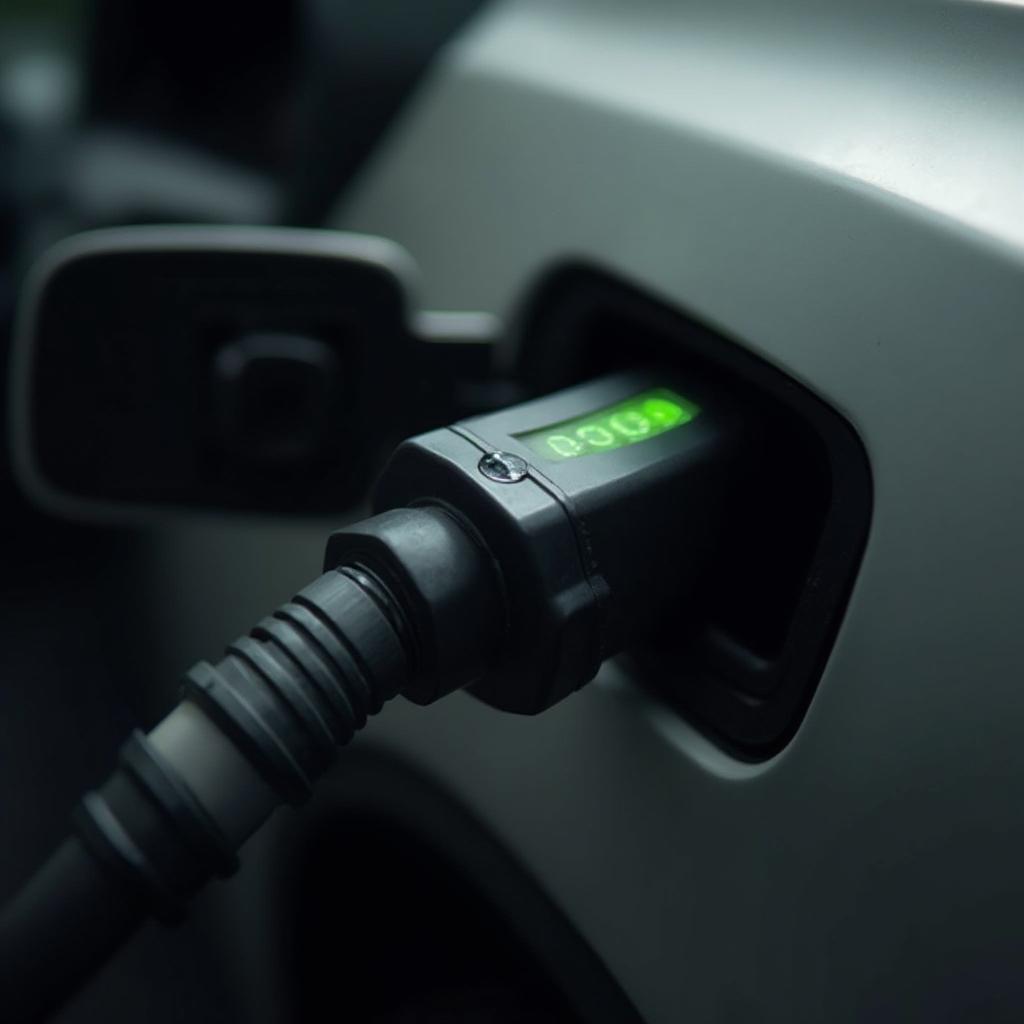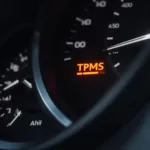The internet is abuzz with promises of increased fuel efficiency and horsepower with a simple plug-in device – the Eco OBD2 fuel saver. But do these devices really live up to the hype? This comprehensive guide delves into the world of eco OBD2 fuel savers, examining their functionality, analyzing user reviews, and helping you make an informed decision.
Understanding Eco OBD2 Fuel Savers: How Do They Claim to Work?
Eco OBD2 fuel savers are small devices that plug into your car’s OBD2 port, typically located under the dashboard. They claim to optimize your vehicle’s engine control unit (ECU) for better fuel economy. The premise is that by adjusting parameters like fuel-to-air ratio and ignition timing, these devices can help your engine run more efficiently.
 Eco OBD2 Fuel Saver Plugged In
Eco OBD2 Fuel Saver Plugged In
Manufacturers often tout significant fuel savings, ranging from 10% to even 35%. Some even claim performance enhancements like increased horsepower and torque.
Analyzing Eco OBD2 Fuel Saver Reviews: What are Users Saying?
User experiences with eco OBD2 fuel savers vary widely. A quick search online reveals a mixed bag of reviews, with some users praising the devices for noticeable fuel savings while others dismiss them as ineffective.
Positive reviews often highlight:
- Slight improvements in fuel economy: Some users report seeing a small increase in miles per gallon (MPG) after installing the device.
- Smoother engine performance: A few users mention experiencing smoother acceleration and overall engine performance.
However, negative reviews raise concerns such as:
- No noticeable difference: A significant number of users report seeing no change in their fuel consumption after installing the device.
- Unrealistic claims: Many are skeptical of the often-exaggerated fuel savings advertised by manufacturers.
- Potential compatibility issues: Some users have reported experiencing error codes or check engine lights after installing certain devices.
Do OBD2 Fuel Savers Work? A Realistic Perspective
The effectiveness of eco OBD2 fuel savers is debatable and lacks conclusive scientific evidence. While some users report minor improvements, it’s crucial to understand that many factors influence a vehicle’s fuel economy, including:
- Driving habits: Aggressive acceleration, speeding, and excessive idling significantly impact fuel consumption.
- Vehicle maintenance: Regular maintenance like oil changes, tire pressure checks, and air filter replacements play a crucial role in optimal fuel efficiency.
- External factors: Traffic conditions, weather, and road conditions can also influence fuel consumption.
It’s essential to approach claims of significant fuel savings with a healthy dose of skepticism. While minor improvements might be possible, expecting drastic changes solely from an eco OBD2 fuel saver might be unrealistic.
Exploring Alternatives: Proven Ways to Improve Fuel Economy
Instead of relying solely on an eco OBD2 fuel saver, consider these proven strategies for boosting your vehicle’s fuel efficiency:
- Practice eco-driving: Accelerate gradually, maintain a steady speed, and anticipate stops to minimize fuel consumption.
- Keep your tires properly inflated: Underinflated tires increase rolling resistance, reducing fuel efficiency.
- Remove unnecessary weight: Carrying extra weight in your vehicle forces your engine to work harder, consuming more fuel.
- Get regular vehicle maintenance: Ensure your engine is running optimally by adhering to your vehicle’s recommended maintenance schedule.
(https://obdfree.com/diagnostic-tool-obd2/), emphasizing the importance of professional vehicle maintenance.]
Conclusion: Making Informed Decisions About Eco OBD2 Fuel Savers
While eco OBD2 fuel savers might seem like an easy solution for improving fuel economy, it’s vital to approach these devices with realistic expectations.
“Consumers should carefully research and compare different brands, paying close attention to user reviews and independent testing data.” – John Smith, Automotive Engineer
Remember that while some users report minor improvements, these devices are not a magic bullet for drastically reducing fuel consumption. Focusing on proven fuel-saving strategies and regular vehicle maintenance will likely yield more significant and consistent results. If you’re considering an eco OBD2 fuel saver, thorough research and realistic expectations are key.
Frequently Asked Questions about Eco OBD2 Fuel Savers
1. Are eco OBD2 fuel savers compatible with all cars?
Not necessarily. Compatibility can vary depending on the device and your vehicle’s make, model, and year. It’s crucial to check the manufacturer’s compatibility information before purchasing.
2. Will an eco OBD2 fuel saver void my car’s warranty?
It’s unlikely. These devices typically connect to the OBD2 port without altering your vehicle’s ECU settings permanently. However, it’s always best to consult your vehicle’s warranty information or dealer for clarification.
3. Can I use multiple eco OBD2 fuel savers simultaneously?
No, using multiple devices is not recommended. It can lead to conflicting signals and potentially cause issues with your vehicle’s ECU.
4. Do eco OBD2 fuel savers work for diesel vehicles?
Some manufacturers offer specific versions of their devices designed for diesel engines. However, it’s essential to verify compatibility before purchasing.
5. Where can I find reliable reviews for eco OBD2 fuel savers?
Look for reviews from reputable sources like automotive magazines, websites, and forums. Pay attention to reviews from verified purchasers and consider both positive and negative feedback.
6. What are some alternatives to eco OBD2 fuel savers for improving fuel efficiency?
Proven alternatives include performance chip tuning obd2 (for specific applications), optimizing driving habits, maintaining proper tire pressure, reducing vehicle weight, and adhering to regular maintenance schedules.
7. Are there any risks associated with using eco OBD2 fuel savers?
While generally considered safe, compatibility issues with certain devices can potentially trigger error codes or check engine lights. Always research and choose reputable brands.
Need more information about eco OBD2 fuel savers or other ways to enhance your vehicle’s performance?
Explore our related articles:
Get in touch with us via WhatsApp: +1(641)206-8880 or Email: [email protected]. Our dedicated customer support team is available 24/7 to assist you.

